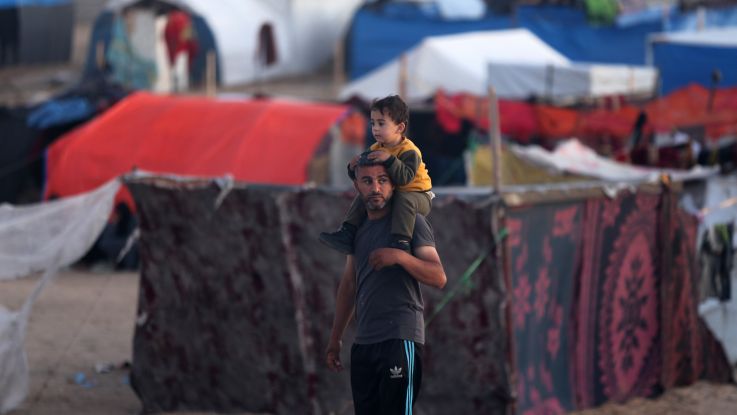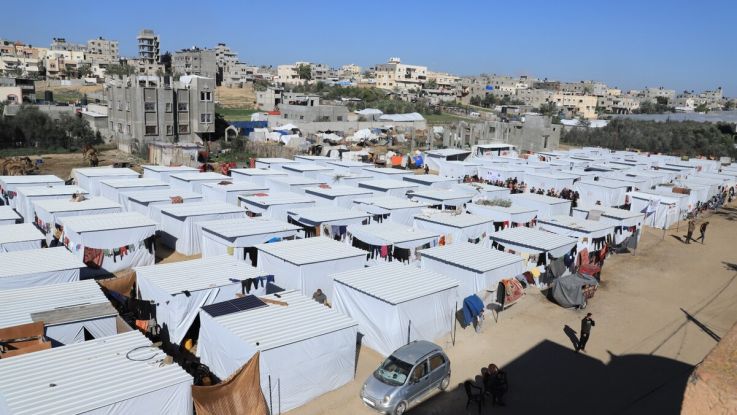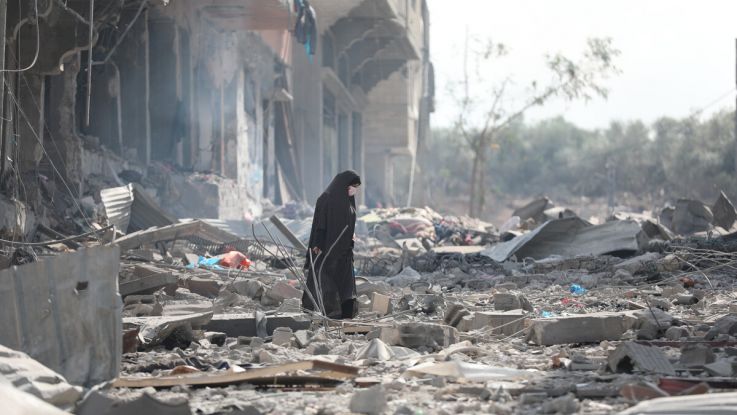Covid: How misinformation can be fatal
1 May 2020
Myths about the spread of global health phenomena are not new. They are a common occurrence and have existed for a long time, but in the age of social media, fake news, and misinformation it is now more important than ever to separate fiction from fact.
Find out how the coronavirus pandemic has generated its own information crisis.
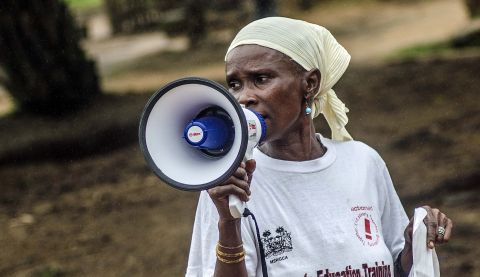
ActionAid volunteer facilitator, Hawa conducts an Ebola awareness session in Sierra Leone in 2014. Photo: ActionAid
As the coronavirus spreads rapidly to the far corners of the world, so too does the mythology surrounding it.
In an era of global communications aided by smart phones, social media channels, accessible internet, and other forms of mass media, it is no surprise that myths, rumours and conspiracies about the Covid-19 pandemic are spreading as swiftly as the virus itself.
Misinformation is insidious in many ways. It hurts those on the receiving-end by causing them injury or even death; it can perpetuate harmful stigmas about others and trigger discriminatory behaviour; and it creates unnecessary fear and anxiety amongst others.
What history can teach us about misinformation
We don’t have to look too far back to see how myths, misinformation and misconceptions exacerbated the AIDS and Ebola crises. While fake news and conspiracy theories circulated, the virus spread and affected more and more people.
In the 80s misinformation about HIV/AIDS inspired conspiracies about whether the disease was real or not. Throughout the HIV epidemic, women were stigmatised and discriminated against, for spreading the disease because of ignorance surrounding AIDS. Proliferation of fake remedies, including a dangerous one about curing AIDS by having sex with virgins led to the rape of young girls.
In South Africa, the failure of governments to accept that there was an epidemic and neglecting to revise their public health policies in the late 90s and early 2000s caused HIV to spread and stop preventable deaths.
ActionAid and our partner organisations have been rooted in many of the communities we work with for over several decades. This is why, local communities around the world consider us a trusted source of information.
In 2014, misinformation spread about the origins of Ebola and drove doubt about the disease. In Sierra Leone, conspiracies circulated about the government using the disease to reduce the population.
Most recently, in 2018, in Democratic Republic of Congo, spread of false news meant people started losing trust in authority figures. Some locals even viewed health workers and doctors with suspicion, who they believed were working with the government. Dozens of people died when armed groups attacked health facilities.1
Now in 2020, global panic and fear about coronavirus has spawned its own rumours and mythologies.
The consequences of the spread of misinformation can be destructive and persistent.
Instead of focusing on early prevention, mitigation and education about coronavirus, concentrating on origins of the disease, pointing fingers at the supposed actors behind it or endorsing the use of false cures is posing a further health risk, an information crisis and propagating prejudice and bigotry.
Issues such as language, technology, and mistrust of authorities may pose barriers in accessing accurate and appropriate information.
Myths can be deadly
The World Health Organisation has stated that the coronavirus outbreak has been accompanied by a huge “infodemic” or too much information - both true and false - that is making it hard for people to find credible sources and guidance about coronavirus.
During this pandemic, supposed miracle cures such as eating large amounts of raw garlic2, injecting bleach, or using chloroquine has caused poisoning and deaths for example in the US and Nigeria3.
Misinformation or lack of accurate, timely information helps spread excessive fear and panic
As the science on a new disease changes rapidly, it follows that there would be considerable amount of confusion about what advice to adhere to.
But in times of heightened stress, risk of following inaccurate information and poor advice can be greater. As we recently witnessed, a paucity of trust and lack of credible, timely information can encourage panic. When coronavirus hit their shores, countries around the world struggled with panic-buying, empty shops and sudden shortage of resources.
Misconceptions facilitate stigma and discrimination
In recent months, we have already seen a rise in violence against some ethnic minorities in the United Kingdom.
Conspiracy theories such as the creation of coronavirus as bioweapon or an accidental leak from a lab in Wuhan, China has led to hate crime against Chinese immigrants in the US, UK and several other countries.4
United States has reported anti-foreigner sentiment rising in Ethiopia where non-nationals have been attacked with stones, chased, denied transportation and accused of being infected with Covid-19.5
Muslims in India have been attacked and accused of spreading the disease following religious gatherings and claims of mosques sheltering visitors6; while claims about Jewish populations spreading the virus has led to anti-Semitism7.
Now, during the Covid-19 pandemic, we are working with several local women leaders to stop fake news and misinformation from spreading and instead, disseminating trustworthy information on how to stay safe.
Why do myths and misinformation spread?
At the heart of fallacies and false stories lies a lack of trust for authorities and experts, absence of credible and equal access to information, a desire to interpret disease within a moral framework8 and denial about the issue.
As in the previous health emergencies, we are witnessing a mistrust of government actors, wariness of experts and there is a risk of suspicion of humanitarian organisations as well.
ActionAid and our partner organisations have been rooted in many of the communities we work with for over several decades. This is why, local communities around the world consider us a trusted source of information.
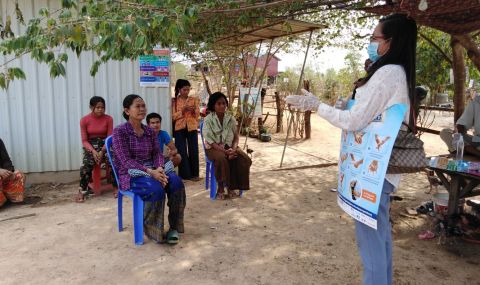
In Cambodia, local women leaders are currently leading the efforts in raising awareness in local communities and distributing soap to vulnerable families. .
ActionAid partners with local women’s networks and has a long-history of working with at-risk and hard-to-reach communities, informing and educating people on preventing diseases and diminishing their spread. We have worked with women and girls with HIV in Kenya and Uganda, and we were there, during and after Ebola epidemic in Liberia and DRC.
Women bear the brunt of health epidemics, but women are also key to sharing useful information
Women are on the frontlines of the Covid-19 pandemic. They are working as medical professionals, caregivers and essential workers, and are facing unique risks and vulnerabilities during this crisis.
But women are also at the centre of helping to curb misinformation and myths about the disease. In India for example, women are using their WhatsApp groups to curtail inaccurate messages and raising awareness about handwashing, hygiene and social distancing through songs, videos and phone messages.
Now, during the Covid-19 pandemic, we are working with several local women leaders to stop fake news and misinformation from spreading and instead, disseminating trustworthy information on how to stay safe.
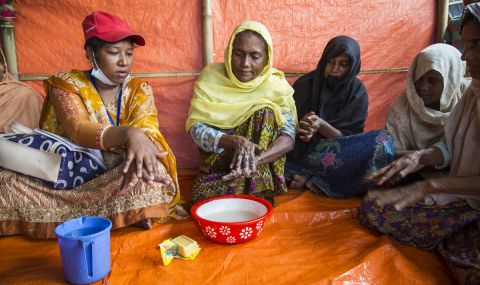
ActionAid staff member Chamli demonstrates handwashing techniques to prevent spread of disease during an ActionAid-led workshop in a Rohingya camp in Bangladesh in 2017.
Our network of women’s groups are educating community members about effective ways to prevent and control the disease.
- In Senegal, we have translated flyers with advice on hygiene into four local languages to make it accessible to all communities.
- In rural areas of Myanmar, women and children are at the biggest risk of being infected because of the lack of access to information. We have provided communication materials to hospitals and distribution of pamphlets to some communities already. The local women’s group is also running awareness sessions on loudspeakers every evening.
- In Haiti, radio, mobile speakers, social media are being used to increase awareness and target remote communities.
- In Vanuatu, the local ‘Women’s Weather Watch’ developed an SMS in the Bislama language which was sent to ¼ of Vanuatu’s population in a short, simple message to raise awareness.
What works and how to share information responsibly
Public information campaigns on Covid-19, such as education on individual protection measures, can help reduce the spread of disease.
However, issues such as language, technology, and mistrust of authorities may pose barriers in accessing accurate and appropriate information.
While access to internet and social media has accelerated the spread of false information, these are also useful tools for the distribution of accurate information.For example, in Rohingya refugee camps, ongoing government restrictions on phone and internet use have impeded access to credible information.
Tips on sharing information responsibly
1. Consider the source
Word-of-mouth can spread fast thanks to modern technology. It is important to consider who is making the claim and what is the source of the information you are receiving.
Consider doing your own, independent research by checking the latest, up-to-date information online from reputable and authoritative sources such the World Health Organisation, the National Health Service and the UK government’s website, before passing on that WhatsApp message or that infographic from Twitter.
Also consider the intention and the funding behind any individual or organisation that passed the information and who is potentially making a profit from that piece of information.
2. Slow down before sharing information
Consider the impact of sharing a piece of information that may be a rumour or story. If you can’t find information to substantiate the claim, then reconsider sharing it onwards.
Think about the impact it may have on those more vulnerable or susceptible to false information or unable to check the facts due to lack of resources.
3. Know that information can change quickly in an evolving situation
We are facing an unknown virus and disease. Research is now taking place behind what causes it, how it affects people, how it spreads and how to cure it.
Preliminary findings from research are just that and can change after reviews and independent inquiry9. New information can rapidly date and expire, so consider the data behind research and reassess the need to spread information that others cannot evaluate critically.
4. Switching off from information overload
We are being inundated with constant information about coronavirus every minute of the day. Taking a break can help reduce the tendency to panic and make impulsive decisions to share misinformation.
How you can help
ActionAid is on the frontline of the coronavirus crisis helping to stop the spread and save lives as the pandemic hits the world’s poorest countries.
From Italy to India, Liberia to Kenya, local ActionAid-supported women’s groups are distributing life-saving advice, health information and hygiene kits to vulnerable communities.
We are also distributing food packages and essential supplies, working to stop violence before it happens, and provide support to women and girls who are affected. Please donate now to help us reach people in urgent need.
Footnotes
- 1http://insecurityinsight.org/wp-content/uploads/2019/12/Overview-Attacks-on-Health-Care-in-the-DRC-Jan-Nov-2019.pdf
- 2https://www.bbc.co.uk/news/world-51735367
- 3https://www.bbc.co.uk/news/52012242
- 4https://www.newyorker.com/news/letter-from-the-uk/the-rise-of-coronavirus-hate-crimes
- 5https://et.usembassy.gov/security-alert-reports-of-anti-foreigner-sentiment/
- 6https://www.buzzfeednews.com/article/nishitajha/coronavirus-india-muslims-tablighi-jamaat
- 7https://forward.com/news/441421/anti-semitic-coronavirus-response-thrives-online-even-on-mainstream/
- 8 https://theconversation.com/coronavirus-and-the-black-death-spread-of-misinformation-and-xenophobia-shows-we-havent-learned-from-our-past-132802
- 9https://www.theguardian.com/world/2020/mar/22/coronavirus-overload-five-ways-to-fight-misinformation-and-fear

